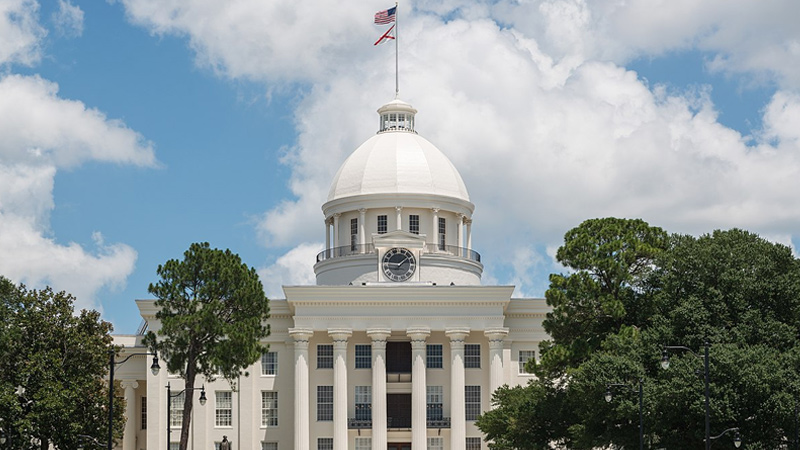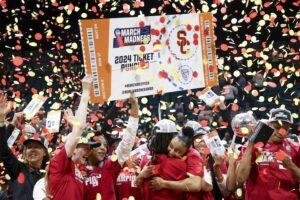Alabama Gambling Bill Proposed for February Session, Casinos and Sports Betting Included
Alabama is seeing renewed efforts to comprehensively overhaul its gambling laws. The activity comes ahead of the opening of its first legislative session of 2024 at the State Capitol (pictured) on February 6.
A proposed bill is set to include a state lottery, sports betting, and Class III Alabama casinos, according to state political insiders who spoke to local media earlier this week.
The push for this legislation is ongoing, as Alabama is one of the few states without any kind of state-wide gambling framework. It instead has some 18 state constitutional amendments that allow various forms of gambling in a dozen different counties and on tribal lands.
This fragmented legal state has led to much confusion among operators, lawmakers, and in the courts.
This new bill aims to repeal all 18 of those amendments and replace them with a comprehensive set of statewide rules covering a state lottery, Alabama casinos, a potential new compact with the Poarch Band of Creek Indians (the state’s federally recognized Tribe running gaming facilities), and provisions for legal sports betting in Alabama.
Governor Kay Ivey has previously expressed support for opening gambling options up to a wider referendum. In 2019, efforts to introduce an Alabama lottery failed in the Senate by just one vote.
“The potential to act on gambling is an opportunity that cannot be accomplished solely by a governor or solely by the Legislature. It is incumbent on us to work together to provide the citizens of Alabama their opportunity to determine the future of gambling in Alabama,” Governor Ivey said in a statement launching a gambling study group late in 2023.
Historical Context and Challenges
Alabama’s 1901 Constitution officially bans lotteries and games of chance, although the 18 local amendments have allowed limited gaming, primarily at dog tracks, and electronic bingo in facilities run by the Poarch Band of Creek Indians.
Past efforts to establish a state lottery have faced opposition, particularly from House Republican caucus members and concerns from dog track owners about unequal access to gambling machines compared to the Poarch Band.
For instance, in 2021, a comprehensive gambling package created a lottery and established some gambling, but failed in the House. The complexity and multifaceted nature of gambling legislation, including distribution of tax revenues and the number of gambling venues, have been major stumbling blocks.
The groups opposing expansion include coalitions of Alabama farmers, as well as religious groups and local communities historically against gambling.
The state came closest to having a statewide lottery in 1999. In a general vote proposed by the last Democratic Governor of Alabama, Don Siegelman, state voters soundly rejected the idea with 54% against.
Siegelman, later sent to prison for more than a decade after a federal investigation into donations he received related to the lottery bill, still voices his regret over the failure two decades later.
“I hate to say I told you so, but I did,” Siegelman said, speaking in 2022.
“You know, in 1999, I was campaigning all over the state urging people to vote for the education lottery that I had proposed, which would have allowed people to buy Powerball tickets at their local grocery store or convenience store. And, you know, we’ve given away billions to Georgia and Florida since.”
New Supporters
Supporters of the new bill apparently include Senator Greg Albritton (R-Atmore) and State Representative Andy Whitt (R-6).
They and others point out that establishing a lottery and legalizing broader gambling forms could generate substantial revenue for the state, opening up new funds for public services or infrastructure projects.
According to a previous study from Governor Ivey’s office, opening the market could mean some $700 million in annual tax revenues for the state across Alabama casinos, lottery, and sports betting.
Whitt says that he himself has personally visited dozens of illegal gambling operations in Alabama, some of which local council leaders and politicians had no idea were actually outlawed.
“I think we have a real chance to pass this one, because it will address every issue that people have brought up over the last several years,” Whitt said, speaking to local outlet The Alabama Reporter earlier in January.
“It will address a lot of what I’ve seen. It will greatly increase our ability to control illegal gambling in the state. In fact, I’d say that even with the new casinos that will be allowed in the bill, we’ll have an overall reduction in gambling in the state, because we’ll finally be able to close down a lot of these illegal operators and keep them closed.”
The Alabama state legislature opens for discussions on February 6, and it seems gambling will be a hot button topic once again.












